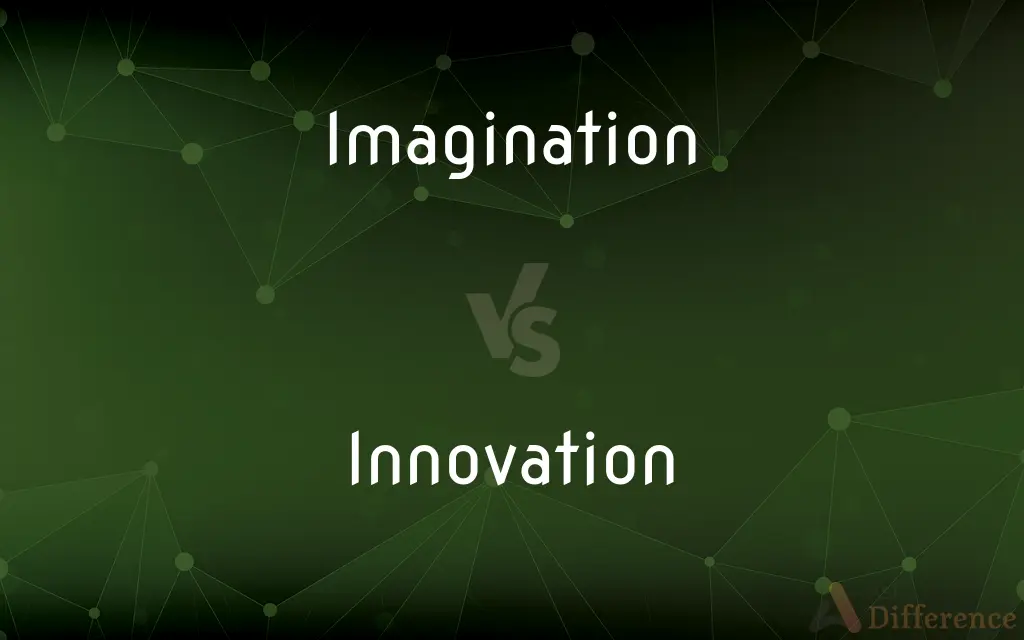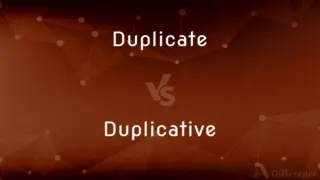Imagination vs. Innovation — What's the Difference?

Difference Between Imagination and Innovation
ADVERTISEMENT
Compare with Definitions
Imagination
Imagination is the ability to produce and simulate novel objects, sensations, and ideas in the mind without any immediate input of the senses. It is also described as the forming of experiences in one's mind, which can be re-creations of past experiences such as vivid memories with imagined changes, or they can be completely invented and possibly fantastic scenes.
Innovation
Innovation is the practical implementation of ideas that result in the introduction of new goods or services or improvement in offering goods or services. ISO TC 279 on innovation management proposes in the standards, ISO 56000:2020 to define innovation as "a new or changed entity creating or redistributing value".
Imagination
The faculty or action of forming new ideas, or images or concepts of external objects not present to the senses
Her story captured the public's imagination
She'd never been blessed with a vivid imagination
Innovation
The action or process of innovating
Innovation is crucial to the continuing success of any organization
Imagination
The ability to form mental images of things that are not present to the senses or not considered to be real
The author uses her imagination to create a universe parallel to our own.
ADVERTISEMENT
Innovation
The act of introducing something new.
Imagination
The formation of such images
A child's imagination of monsters.
Innovation
Something newly introduced.
Imagination
One of these mental images
"some secret sense ... which ... took to itself and treasured up ... her thoughts, her imaginations, her desires" (Virginia Woolf).
Innovation
The act of innovating; the introduction of something new, in customs, rites, etc.
Imagination
The mind viewed as the locus or repository of this ability or these images
"This story had been rattling around in my imagination for years" (Orson Scott Card).
Innovation
A change effected by innovating; a change in customs
Imagination
The ability to confront and deal with reality by using the creative power of the mind; resourcefulness
Handled the problems with great imagination.
Innovation
Something new, and contrary to established customs, manners, or rites.
Imagination
Attention, interest, or enthusiasm
An explorer's ordeal that caught the imagination of the public.
Innovation
A newly formed shoot, or the annually produced addition to the stems of many mosses.
Imagination
The image-making power of the mind; the act of mentally creating or reproducing an object not previously perceived; the ability to create such images.
Imagination is one of the most advanced human faculties.
Innovation
The act of innovating; introduction of something new, in customs, rites, commercial products, etc.
Imagination
Particularly, construction of false images; fantasizing.
You think someone's been following you? That's just your imagination.
Innovation
A change effected by innovating; a change in customs; something new, and contrary to established customs, manners, or rites.
The love of things ancient doth argue stayedness, but levity and lack of experience maketh apt unto innovations.
Imagination
Creativity; resourcefulness.
His imagination makes him a valuable team member.
Innovation
A newly formed shoot, or the annually produced addition to the stems of many mosses.
Imagination
A mental image formed by the action of the imagination as a faculty; something imagined.
Innovation
A creation (a new device or process) resulting from study and experimentation
Imagination
The imagine-making power of the mind; the power to create or reproduce ideally an object of sense previously perceived; the power to call up mental imagines.
Our simple apprehension of corporeal objects, if present, is sense; if absent, is imagination.
Imagination is of three kinds: joined with belief of that which is to come; joined with memory of that which is past; and of things present, or as if they were present.
Innovation
The creation of something in the mind
Imagination
The representative power; the power to reconstruct or recombine the materials furnished by direct apprehension; the complex faculty usually termed the plastic or creative power; the fancy.
The imagination of common language - the productive imagination of philosophers - is nothing but the representative process plus the process to which I would give the name of the "comparative."
The power of the mind to decompose its conceptions, and to recombine the elements of them at its pleasure, is called its faculty of imagination.
The business of conception is to present us with an exact transcript of what we have felt or perceived. But we have moreover a power of modifying our conceptions, by combining the parts of different ones together, so as to form new wholes of our creation. I shall employ the word imagination to express this power.
Innovation
The act of starting something for the first time; introducing something new;
She looked forward to her initiation as an adult
The foundation of a new scientific society
He regards the fork as a modern introduction
Imagination
The power to recombine the materials furnished by experience or memory, for the accomplishment of an elevated purpose; the power of conceiving and expressing the ideal.
The lunatic, the lover, and the poetAre of imagination all compact . . . The poet's eye, in a fine frenzy rolling,Doth glance from heaven to earth, from earth to heaven,And as imagination bodies forthThe forms of things unknown, the poet's penTurns them to shapes, and gives to airy nothingA local habitation and a name.
Imagination
A mental image formed by the action of the imagination as a faculty; a conception; a notion.
The same power, which we should call fancy if employed on a production of a light nature, would be dignified with the title of imagination if shown on a grander scale.
Imagination
The formation of a mental image of something that is not perceived as real and is not present to the senses;
Popular imagination created a world of demons
Imagination reveals what the world could be
Imagination
The ability to form mental images of things or events;
He could still hear her in his imagination
Imagination
The ability to deal resourcefully with unusual problems;
A man of resource
Share Your Discovery

Previous Comparison
Duplicate vs. Duplicative
Next Comparison
Church vs. Monastery













































